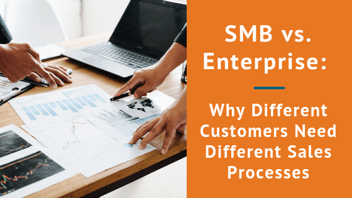For many sales organizations, small and medium-sized businesses (SMBs) represent a great untapped market. However, these companies require a thoughtful sales approach that may differ from how you treat your enterprise customers. Customer Success is one area in particular that is essential to your SMB sales plan.
The United States is home to more than 30 million SMBs, which account for 99.9 percent of all U.S. businesses. Small businesses are those that generate less than $50 million in annual revenue, while medium-sized businesses sit between $50 million and $1 billion in annual revenue. These figures may be small compared to those of many enterprises, but they still represent a sizable selling opportunity that should not be ignored.
Considering the sheer number of potential customers out there, boosting your SMB sales is bound to create an increase in revenue. All it takes is a recalibration of your sales approach for the specific needs of SMBs.
SMB Buying Habits
At an SMB, there are typically fewer decision makers, and many SMB owners find themselves responsible for several business areas. Understandably, leaders are sometimes more constrained by both time and budget concerns than they would be at a larger company.
SMBs often demonstrate the following buying habits:
-
Much like consumers, they do a great deal of research before making a purchase or contacting vendors.
-
They spend money cautiously because they tend to have smaller budgets.
-
They recognize that spending money on the wrong solution can waste both time and money, so they often put off these decisions.
As you develop an SMB sales plan, it is important to keep these buying habits in mind, because they will help you better understand the SMB sales process.
Rethinking the SMB Sales Process
In most cases, an SMB customer is going to have a much different Buyer’s Journey than an enterprise customer will. Rather than a sales funnel, the sales process for SMBs is much more like a circle.
One of the factors at play here is that SMBs tend to traverse about 70 percent of the Buyer’s Journey by the time they reach out to a supplier. Because SMBs are more risk-averse, they do more research up front. By the time they contact a vendor, they often already have a solution in mind.
As a result, the role of the salesperson has become much more consultative for SMBs. Rather than focusing primarily on making the sale, the seller should be driven by Customer Success.
A Focus on Customer Success
Because SMBs tend to do significantly more research before making a purchase, your sales team doesn’t necessarily need to spend the majority of their time selling the client on the features and benefits of a specific solution. Instead, your team has the opportunity to act as their partner, consulting with them through each step of the sales process.
SMB decision makers, who are already short on time, are often bombarded with information about their industries and products that promise to help them succeed. Your sales team can help them make sense of that information, providing much-needed context to help them determine what they truly need and how a given solution will benefit their business.
One of the best ways to cater to SMBs is to have a sales team that includes specialists who support the customer at each stage of the sales journey. You might restructure your sales team with specialists such as:
-
Account executives
-
Account managers
-
Customer development representatives
-
Customer Success managers (CSMs)
This change in structure will allow your sales reps to specialize in a particular part of the Buyer’s Journey, enabling them to provide an unprecedented level of support to each customer.
For SMBs, CSRs are particularly important. After the customer signs a contract, their dedicated CSR helps them through onboarding and adoption. This focus on Customer Success demonstrates that your company is advocating for its customers. And customers appreciate this connection. Eighty percent of buyers say their experience working alongside a vendor is as important as their product or service.
When working with SMBs, prioritizing Customer Success creates “stickier” customers, which promotes recurring revenue and increases each customer’s lifetime value. In fact, Forrester found that vendors with a strong Customer Success program are 54 percent more likely to retain 90 percent of customers. And as the relationship grows, your CSR has more opportunities to deepen the connection through upselling and cross-selling.
Finding an SMB Sales Partner
Selling to SMBs can be challenging because these customers tend to be careful and well informed when making purchases. However, by slightly rethinking your sales approach, and making a Customer Success Team a priority, you will improve your odds of forming close bonds with your SMB customers.
Partnering with a Sales as a Service® provider can help you make the most of your efforts in the SMB market. An outsourced sales team can provide cost-effective lead qualification and nurturing to support SMB prospects until they decide to become customers. This frees up your sales team to focus on Customer Success, which is a surefire way to hold on to SMB customers and maximize your profits.




![[EBOOK] Tapping into the Rich Market of Small and Medium-Sized Businesses](https://no-cache.hubspot.com/cta/default/2602672/f87bd59a-589c-4e5a-8e66-4e34cc05683a.png)




